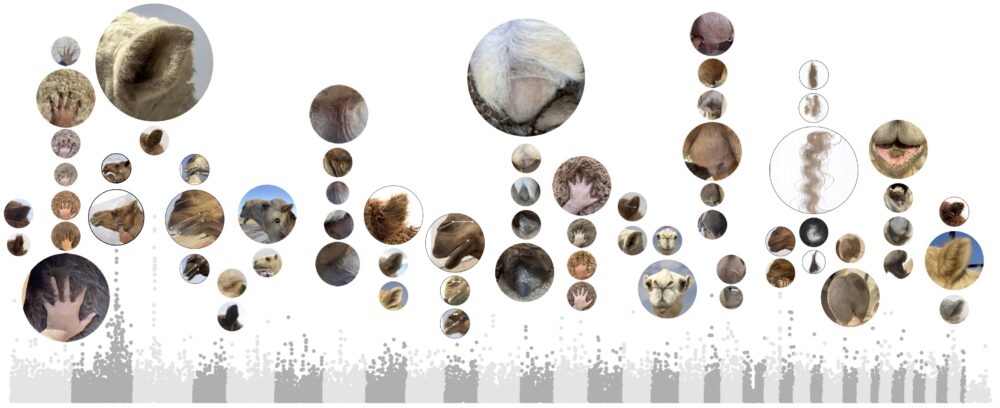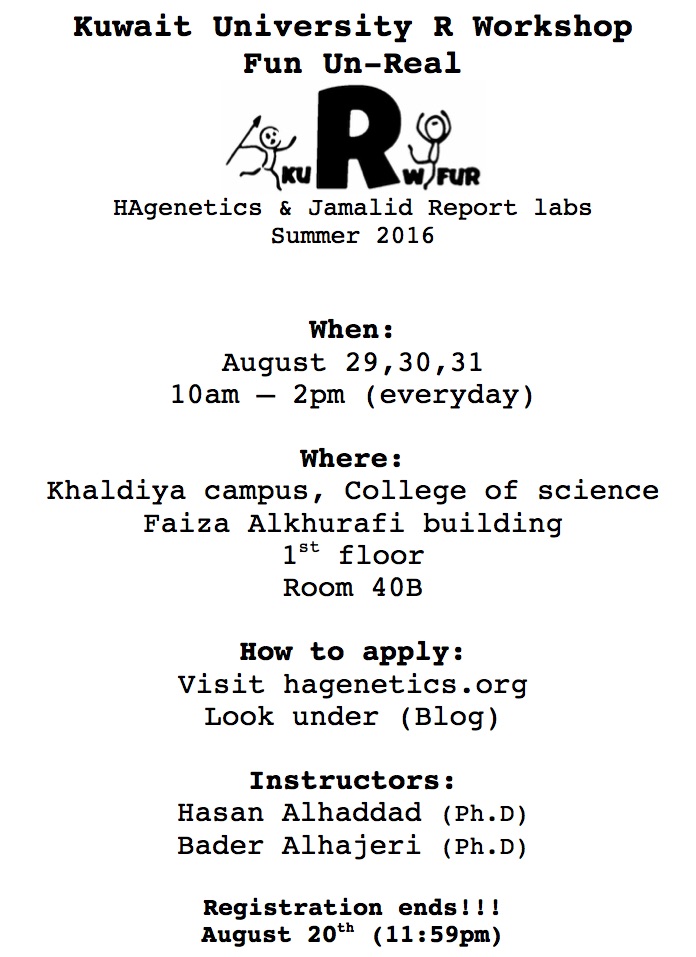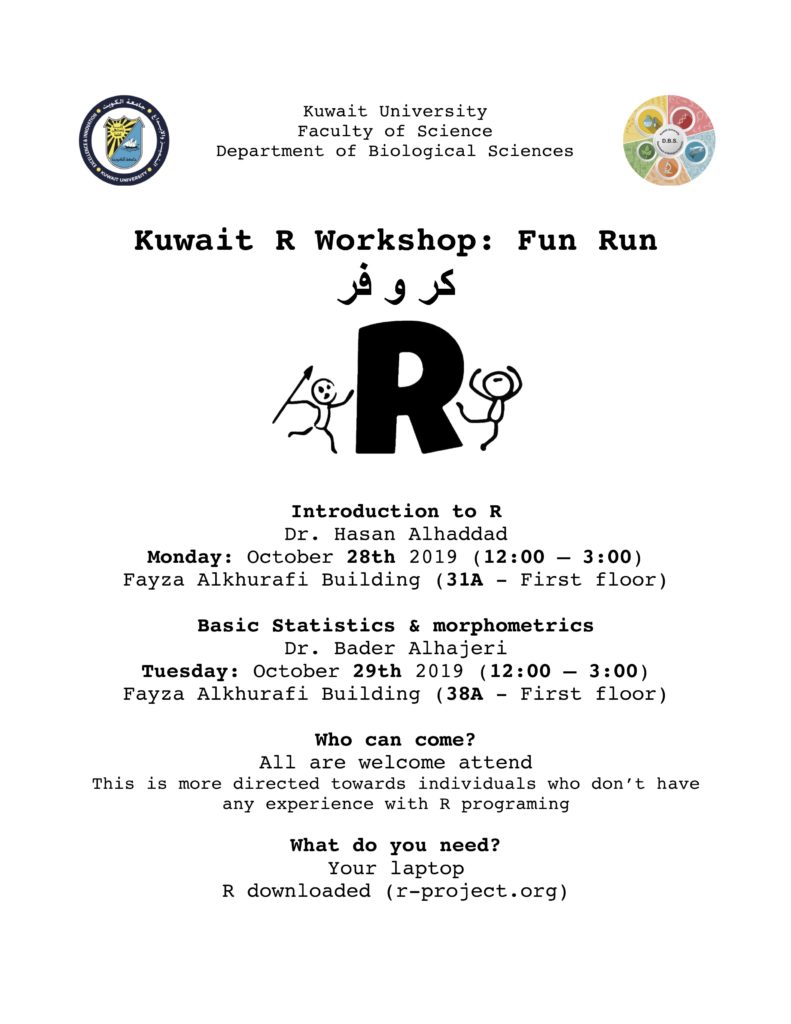
Category Archives: Uncategorized
KURwFUR 2016 program
Our detailed program for the 3 days workshop is available to be viewed and downloaded (2016_KURwFUR_program)
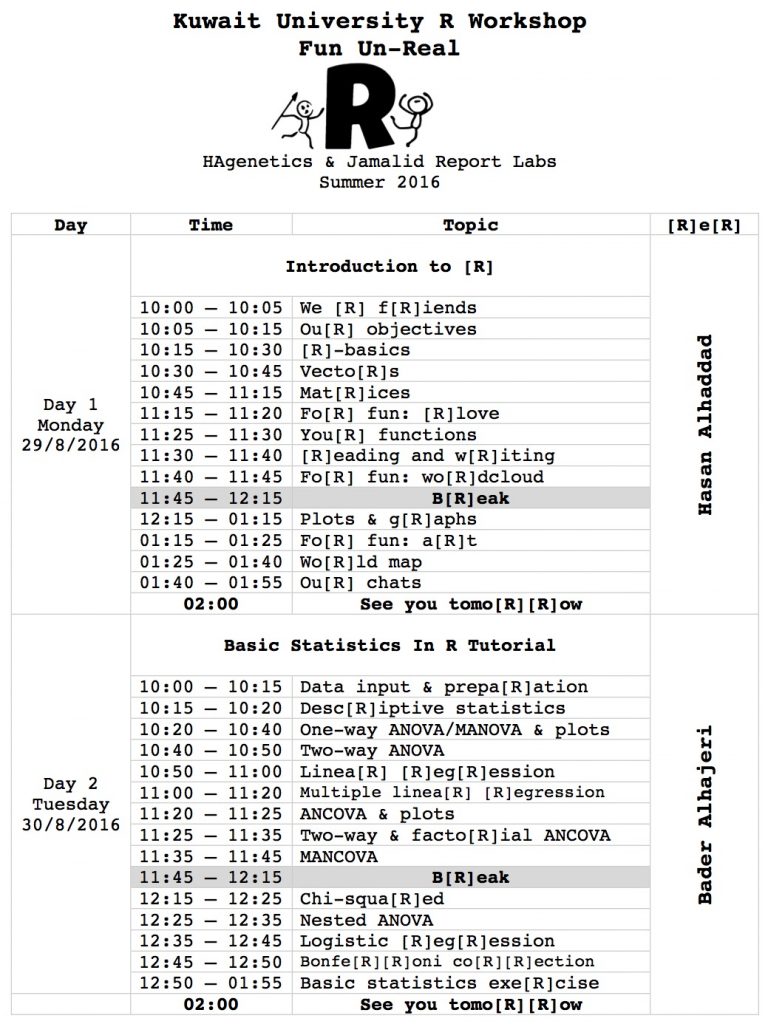
Recommended Programs
KURwFUR participants:
All the following programs are free, and could make the process of R coding easier, especially for PC users, and also for other purposes:
RStudio
A powerful and productive user interface for R
Notepad2
Notepad-like text editor with syntax highlighting
FigTree
A graphical user-interface (GUI) application for viewing phylogenies and producing publication quality figures
Bader H. Alhajeri
Hello KURwFUR-2016 participant
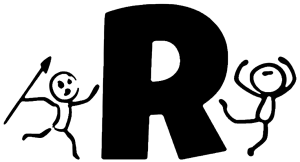
We are pleased that you are interested in our workshop. We look forward to provide you with an informative, beneficial, and fun learning experience. Below are some instructions/suggestions:
- Wear something comfortable. We will spend a few hours setting and enjoying R experience.
- Bring your favorite mug. We will provide a coffee machine and tea + hot water.
- Bring a sweater. It might get a bit cold due to the air conditioner not Kuwait’s weather.
- The full program of the workshop will be emailed to you and posted here.
- Do not forget to bring your laptop with its charger.
- Do not forget to bring your portable wifi (if you have one).
- Bring your data in case you want to analyze it using R.
- Please remember that we would like to make this workshop a fun learning experience.
R software download:
- You need to go to (r-project.org). Click on download R.
- From the CRAN Mirrors page, click on (Hungary, Rapporter.net, Budapest). You will get another page entitled Download and Install R.
For PC:
- Click on Download R for Windows
- You’ll be directed to another page titled R for Windows
- Choose install R for the first time
- Click on Download R 3.3.1 for Windows and choose save file
- Run the downloaded file choosing English as the language
- Go with the default settings (keep clicking next till it is installed)
- You will get an R icon on your desktop.
For MAC:
- Click on Download R for (Mac) OS X
- Choose the link that correlates to your system’s version. (For example R-3.3.1.pkg if your running system is OS X 10.9 or higher)
- Run the downloaded program, if you get (unidentified developer) message open Settings > Security and choose open anyways.
- Go with the default settings, and click install.
- The R icon will appear in the applications area.
You are all set now to have some fun!
Please, feel free to email (jamalidreport@gmail.com) for any concerns or questions.
Thank you…
KURwFUR organizers
KURwFUR Summer 2016 (كر وفر)
How to apply?
-
Download application form (2016_KURwFUR_application).
-
Fill out the application.
-
Save the application with your name at the end (ex. 2016_KURwFUR_application_NAME).
- Email the application (ex. 2016_KURwFUR_application_NAME) to jamalidreport@gmail.com.
- Make sure the following is included in your email:
- Subject: KURwFUR 2016 application
- Attach the file (ex. 2016_KURwFUR_application_NAME)
For your information:
- Registration starts now.
- Registration ends August 20th (11:59 pm).
- Applications will be reviewed and evaluated.
- Only 15 applicants will be accepted.
- KURwFUR is offered to:
- Researchers
- M.Sc. and Ph.D. holders
- Graduate students
- Undergraduate students working in a lab (If you are an undergraduate student, you need to submit a short recommendation letter from your professor, and we will look into your application).
- You will get an email about your acceptance/rejection after the 20th of August.
- Note: If accepted, there is a refundable deposit required to participate (30 KD). This is only as an insurance of your seriousness. You will get your money back during the workshop.
Forensic Analysis of Biological Evidence (301)
Below are the lectures prepared for the class. Click on the title of the lecture and it will take you to SlideShare website where you can download the material as pdf.
301_syllabus_Spring2018
Lec 1: General Introduction
Lec 2: Review of genetics
Lec 3: Mendel’s experiments and factors
Lec 4: The genome: genetic material
Lec 5: DNA chemical composition
Lec 6: DNA structure and genetic code
Lec 7: Genomic coding and non-coding
Lec 8: Cells and DNA sources
Lec 9: DNA extraction
Lec 10: DNA Quality and Quantity
Lec 11: PCR
Lec 12: DNA sequencing: Sanger method
Lec 13: Genome assembly & resequencing
Lec 14: Polymorphisms: repeats & SNPs
Lec 15: Genotyping STR
Lec 16: Genotyping SNPs
Lec 17: Bi-allelic vs. multi-allelic markers
Lec 18: STR: Allele/genotype frequencies
Lec 19: SNP: Allele/genotype frequencies
Lec 20: Objective vs. subjective evidence
Lec 21: Panel of molecular markers
Lec 22: Frequency database
Lec 23: Genetic profiling
Lec 24: Probability of match/exclusion
